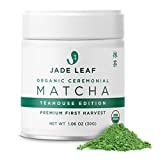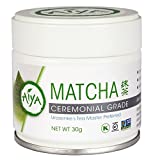Is Matcha Good for PCOS?
Polycystic Ovary Syndrome (PCOS) affects millions of women worldwide, presenting a range of physical and emotional symptoms. Managing PCOS often requires a combination of dietary and lifestyle changes. One such modification is the consumption of green tea, particularly matcha, which offers numerous health benefits. This article delves into the advantages of matcha for women with PCOS.
Benefits of Green Tea for PCOS
Matcha, a finely ground powder made from green tea leaves, is traditionally consumed in East Asia. The green tea plants used for matcha are shade-grown for three to four weeks before harvest, and the stems and veins are removed during processing.
Matcha and green tea offers a range of benefits for women with PCOS, including:
Improved insulin resistance
Insulin resistance is a root cause of PCOS, as high insulin levels disrupt hormone balance and cause ovaries to overproduce androgens. Green tea, rich in epigallocatechin gallate (EGCG), helps regulate blood sugar levels and improves insulin sensitivity, reducing the risk of type 2 diabetes. This makes effective blood sugar management and insulin sensitivity crucial for a successful PCOS management strategy.
Decreased androgen levels
Green tea’s ability to balance hormones and reduce androgen levels in the blood helps alleviate common PCOS symptoms such as acne, hirsutism, hair loss, anovulation, and irregular periods. One study found that women with PCOS who supplemented with green tea extract experienced significantly reduced testosterone levels after 12 weeks.
Less caffeine than coffee
Matcha has a higher caffeine content than regular green tea but less than brewed coffee, making it an ideal alternative for those seeking a moderate caffeine boost. The slow-release caffeine in matcha is easier on stress hormones and doesn’t lead to energy crashes, as it provides a steady flow of energy without the sudden jolts associated with coffee.
Weight loss
Weight gain and difficulty losing weight are common issues for women with PCOS due to hormonal imbalances and metabolic dysfunctions. Green tea has been shown to increase metabolic rate, supporting weight loss efforts. Some studies have found green tea effective in reducing body fat percentage, especially in the abdominal area. The metabolism-boosting effects of green tea are attributed to the high amounts of EGCG and caffeine, which also help suppress appetite and control cravings.
Liver support
The liver plays a critical role in hormone regulation and detoxification. Women with PCOS are at an increased risk of developing liver disease, such as nonalcoholic fatty liver disease (NAFLD). Green tea has liver-protecting properties, decreasing lipid accumulation in the liver and reducing the risk of liver disease.
Anti-inflammatory effect
Green tea is rich in catechins (EGCG), a type of polyphenol associated with multiple health benefits. Its strong antioxidant and anti-inflammatory properties are essential for maintaining optimal health, preventing diseases, and managing PCOS symptoms. Inflammation is a significant contributor to PCOS development and progression, making a diet rich in anti-inflammatory and antioxidant compounds highly effective.
Matcha Reduces Facial Hair/Hair Loss
Green tea acts as a 5-alpha-reductase inhibitor, blocking the conversion of testosterone to Dihydrotestosterone(DHT). DHT is the most potent form of testosterone in the body and is responsible for PCOS-related facial hair and hair loss. Green tea helps to inhibit the enzyme 5-alpha reductase, which converts testosterone to DHT. Many women have noticed improvements in their PCOS facial hair after regularly drinking matcha.
Matcha Reduces Cravings/Appetite
Matcha has an appetite-suppressing effect, which can be helpful when trying to stick to a nutritional plan. Many people find that their appetite is reduced on mornings when they drink matcha. Incorporating protein into a matcha-based breakfast can make it a satisfying and healthy start to the day.
Matcha Supports Immune Health and Hormone Balance
Matcha is a rich source of antioxidants, which aid hormone metabolism by supporting the liver’s detoxification pathway. Additionally, matcha contains numerous polyphenols, plant components that nourish good gut bacteria. A healthy gut microbiome is essential for immune health, with about 80% of our immune health dependent on our gut bacteria.
Matcha Reduces Anxiety
Matcha contains L-theanine, a component that helps our body produce a neurotransmitter called GABA. GABA is a natural anti-anxiety neurotransmitter, and those with PCOS often have a deficiency. A daily dose of L-theanine from matcha may help promote a sense of calm and balance, potentially improving adrenal function.
Matcha Improves Acne/Skin Health
Matcha reduces sebum production, which helps decrease acne. Additionally, the antioxidants in matcha provide a healthy glow to the skin. Many people have reported improvements in their skin after incorporating matcha into their daily routine.
Matcha and Caffeine Content
Matcha, a finely ground powder made from green tea leaves, is traditionally consumed in East Asia. The green tea plants used for matcha are shade-grown for three to four weeks before harvest, and the stems and veins are removed during processing. The resulting matcha has a higher caffeine content than green tea but less than brewed coffee, making it an ideal alternative for those seeking a moderate caffeine boost. The slow-release caffeine in matcha is easier on stress hormones and doesn’t lead to energy crashes, as it provides a steady flow of energy without the sudden jolts associated with coffee.
Quality matters
Buying high-quality organic matcha matters for several reasons, including taste, nutritional content, environmental impact, and potential health benefits. Here are some key reasons why you should consider purchasing high-quality organic matcha:
Taste: High-quality organic matcha typically has a richer, smoother taste and more vibrant green color compared to lower-grade matcha. The flavor is often described as slightly sweet with a pleasant bitterness, making it an enjoyable drink for many people.
Nutritional content: High-quality organic matcha is made from the freshest, young leaves of the tea plant, which are shade-grown to boost their chlorophyll and amino acid content. This process results in a more nutrient-dense product that is packed with antioxidants, vitamins, and minerals.
Health benefits: Organic matcha is free of synthetic pesticides and fertilizers, which can have negative effects on human health. Additionally, high-quality matcha is known for its high antioxidant levels, particularly EGCG (epigallocatechin gallate), which may help reduce inflammation, protect cells from damage, and promote overall health.
Environmental impact: Organic farming practices are generally more sustainable and eco-friendly than conventional methods. They help conserve soil, reduce pollution, and promote biodiversity. By choosing organic matcha, you are supporting a more sustainable agricultural system.
Purity and safety: High-quality organic matcha producers adhere to strict standards that ensure the purity and safety of their products. They often have their products tested for contaminants such as heavy metals, pesticides, and radiation to ensure that the matcha you consume is safe.
Supporting small-scale farmers: Many high-quality organic matcha producers source their tea leaves from small-scale farmers who practice traditional and sustainable farming methods. By choosing these products, you are supporting these farmers and helping preserve their traditional way of life.
Overall, buying high-quality organic matcha not only provides you with a superior taste experience and potential health benefits, but also contributes to a more sustainable and eco-friendly world.
Ceremonial or Culinary Grade?
Ceremonial grade matcha and culinary grade matcha are two main categories of matcha green tea powder, and they differ in terms of quality, flavor, color, and intended use. Here’s a comparison of ceremonial grade matcha and culinary grade matcha:
Quality and processing: Ceremonial grade matcha is made from the youngest, most tender tea leaves, which are hand-picked, shade-grown, and carefully processed to preserve their nutritional content and flavor. Culinary grade matcha, on the other hand, is made from slightly older tea leaves and may include leaves from various parts of the plant. The processing might be less meticulous, resulting in a lower-quality product.
Color: Ceremonial grade matcha has a vibrant, bright green color due to the high chlorophyll content in the young leaves. Culinary grade matcha is usually a duller, less vibrant green, which can be attributed to the use of older leaves with lower chlorophyll content.
Flavor: Ceremonial grade matcha is known for its smooth, delicate, and slightly sweet taste with a pleasant bitterness. Culinary grade matcha tends to have a stronger, more bitter taste and may lack the subtle sweetness found in ceremonial grade matcha.
Intended use: Ceremonial grade matcha is intended for traditional tea ceremonies and for drinking on its own, mixed with hot water. Culinary grade matcha is specifically designed for use in recipes, such as smoothies, lattes, baked goods, and other matcha-infused dishes.
Price: Due to the meticulous production process and higher quality, ceremonial grade matcha is typically more expensive than culinary grade matcha.
Nutritional content: Ceremonial grade matcha generally has a higher nutritional content, including more antioxidants and amino acids, than culinary grade matcha. This is due to the use of younger leaves and the careful processing methods employe
In conclusion, ceremonial grade matcha is the highest quality matcha, ideal for drinking and traditional tea ceremonies, while culinary grade matcha is suitable for cooking and baking.
The Best Matcha’s for PCOS: 100% Organic, High Quality, and Ceremonial Grade


Aiya Authentic Japanese Origin Ceremonial Grade Matcha Green Tea Powder

Matcha Latte Recipe
To make a daily matcha latte, gather the following ingredients:
- 1 tsp organic ceremonial grade matcha
- 2 scoops collagen
- A large glass or cup (12-16 oz)
- Hot water (boiled, then slightly cooled), about 2 oz.
- Ice (or not if you want it hot)
- Your favorite non-dairy milk, preferably a creamy kind like coconut, cashew, or oat
In a matcha mixing bowl or mug, mix the matcha, collagen, and just enough hot water to dissolve them (usually an ounce or two). Use a bamboo whisk to froth the matcha. In your drinking glass, fill halfway with ice and add non-dairy milk, leaving room at the top for your matcha mixture. Pour the matcha mix on top and enjoy!
In conclusion, matcha tea provides a variety of benefits for women with PCOS, making it a valuable addition to a PCOS management strategy. Its properties can help improve insulin resistance, decrease androgen levels, reduce ovarian cysts, aid weight loss, support liver health, and provide anti-inflammatory effects. By incorporating matcha into their daily routine, women with PCOS can potentially improve their overall health and alleviate some symptoms associated with the condition.






